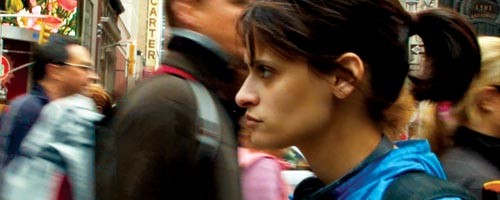Let's call her Leah -- Leah Cruz, age 19, 5 feet 6 inches tall, from Colorado. That's the scant identity she's been taught to memorize in case she gets caught. She doesn't look Anglo-European, but she doesn't look clearly like anything else. She's close to her loving parents, whom she tells people are dead.
Her teachers are her co-conspirators, most of them masked, of all races, and with neutral American accents, except for an Irish woman, and a deaf man who signs. They don't talk about why they're doing it. That's understood. In the 48 hours before Leah will detonate her bomb in Times Square, they test her loyalty again and again, and they make sure she knows the drill.
It sounds almost clichéd to say that Julia Loktev's Day Night Day Night is an "anatomy of" a terrorist. And yet, how many other films have taken on this theme seriously (as opposed to using terrorism as a hook for a thriller plot)? We never learn who these people are nor what they believe, an omission that Loktev employs to unnerve us even more. But it doesn't unnerve and it doesn't enlighten -- at least, no more than the daily news.
Terrorism really isn't a mystery in our modern world, unless you're mystified why religious (or political) fanatics (or "combatants") would urge their children to blow themselves up. So Loktev asks a question whose answer is either too recondite to dramatize or merely the result of a socio-cultural mental illness, or both.
The result is an interesting, thoughtful, well-made film that ends up being more like a thriller than Loktev probably intended. Do all suicide bombers practice such good hygiene? Do they all bounce on the bed the night before the day of their deed? These are odd moments invented to suggest that Terrorists Are Us, and that if you brush daily when you're not planning to die the next day, you'll probably stick with the habit on your eve of destruction.
If she's about to get caught, Leah's commanders tell her, just do it, even if no one is around. Still connected to her own brain, as well as her mission to kill people, she asks, "Why would I do this if no one's around?" Their answer, from behind their masks, is a silent punishing stare that puts her back in her place.
Leah has memorized several litanies of faith. One of them opens the film: "Everyone dies," she says, to herself, in a rapid whisper so soft that Loktev uses subtitles for us to "hear." She ends this recitation: "I have only one death. I want my death to be for you." Presumably, "you" is a deity. Or maybe it's a crush (she seems lonely). Who knows? We don't. And Loktov doesn't know either, for to know would turn her film from the intellectual to the experiential. 
Starts Fri., June 29. Harris















